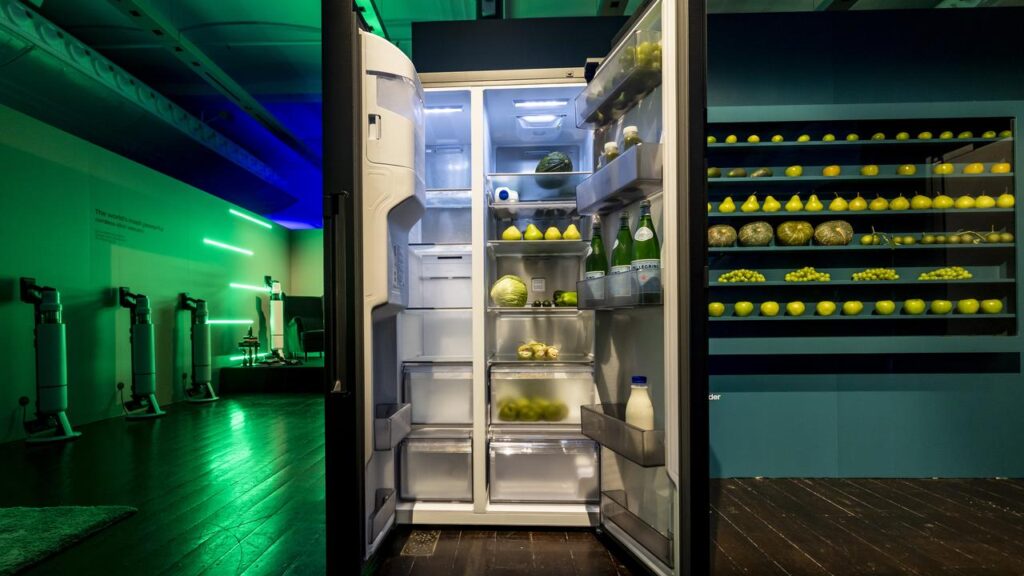AI in every room: why home appliances are getting smart
Jennifer Dudley-Nicholson |

Lights flick on as you enter the hall, the air-conditioner has pre-chilled the lounge, the robot vacuum has cleaned up, and the fridge sends you a message to let you know your cheese is nearing its expiry date.
The artificially intelligent fridge can, if you agree, suggest recipes involving cheese and share them with the oven.
This scenario is not from the future but one white goods manufacturers are keen for consumers to embrace now.
Samsung Australia this week launched an extensive range of appliances powered by artificial intelligence, from washing machines to ovens, that will compete with similarly smart products from LG, Hisense, Ecovacs, Philips, Electrolux and more.
Experts say the trend proves all appliances will be fuelled by AI in an effort to make them more convenient, although they warn of potential downsides to the change, including challenges to get multiple brands to work with one another and the risk of premature obsolescence.
Samsung launched its AI electronics showcase in Sydney’s Town Hall, where product experts demonstrated refrigerators with embedded cameras for cataloguing food and ovens capable of sending alerts when they detect dinner is burning.

The advanced software and hardware features are being considered in the design stage, Samsung Australia consumer electronics director Phil Gaut says, rather than being added to appliances as afterthoughts.
“This year is the first time AI has been at the centre of product research and product development,” he says.
“That’s the way we believe the market is going to go and that’s where we see benefit, whether it’s answering the doorbell from a washing machine or whether it’s the ability, when you’ve left home and you’re driving down the road, to check if you’ve left something on.”
Most of the latest internet-connected, AI appliances feature large touchscreens, familiar apps such as Spotify and YouTube, and some add cameras for specific purposes, such as assessing the dirt on clothes or streaming video of food as it cooks.
Energy savings are also a growing focus for AI-powered appliances, Mr Gaut says, with several Australian electricity retailers making their prices available within Samsung’s appliance app.
Using this information, consumers can work out how much energy it takes to wash a load of clothes, for example, and determine whether there’s a cheaper time of day to do it.
“There’s a big solution with British Gas in the UK where you can take the (Samsung) SmartThings platform, add your gas tariff, and it pushes notifications (like) if you delay putting your dishwasher on for an hour it will save you 20 per cent on your wash cycle,” he tells AAP.
“There are some really exciting projects happening globally and we’re looking at them locally to continue to move the needle.”
Saving energy is one of the top reasons Australian consumers consider investing in AI-powered appliances, says Foad Fadaghi, managing director of Telsyte, which analyses emerging technology.

While the popularity of smart devices is high in Australia, and remains steady, he says many potential buyers are switching their focus from what they can automate to what savings they can achieve.
“People are definitely after convenience and they’re after true intelligence – artificial intelligence – and things that will save them money,” he says.
“The smart energy sector has been resilient despite the cost of living because the price of energy continues to go up.”
Smart appliances do face challenges in Australia, however.
The electronics industry launched an open-source standard called Matter in 2022 to help more smart home devices connect to one another, but Mr Fadaghi says its adoption has been slow and fragmented.
Some consumers are also concerned smart appliances will not last as long as more basic models, given they will require software updates and ongoing support.
“One of the fears is that we get into an upgrade cycle for fridges, for example, that is the same as smartphones,” he says.
“That’s not what consumers are after – they’re after something that lasts for five to 15 or 20 years for some appliances.”
Samsung has pledged to offer seven years’ of software updates to its smart appliances, while companies including Miele and Hisense offer up to 10 years of support, and Philips promises five years of updates for its smart lights and accessories.
Despite concerns, University of NSW AI Institute chief scientist Toby Walsh says the move from dumb devices to smart appliances is inevitable.

“Anything electric is going to have AI added to it to make it hopefully easier to use and more engaging,” he says.
“Most things, whether they be our toasters, oven or front doorbells, don’t have keyboards so we’re going to talk to them and that will mean they’ll have to have some AI to understand us.”
AI-powered appliances have the potential to set routines and add more convenience for households, Professor Walsh says, just as the original washing machines revolutionised clothes maintenance.
Rules to govern what smart appliances can do, how they do it, and whether they remain secure while connected to the internet will be important, he says.
After all, today’s smart appliances and voice assistants are fulfilling a role predicted in the 1968 film, 2001: A Space Odyssey.
“People don’t realise everything HAL does, you can have in your home today: an AI you can talk to, have a decent conversation with, play chess with, open the doors upon your instruction,” Dr Walsh says.
“It shows how (technology) has become part of the furniture.”
AAP